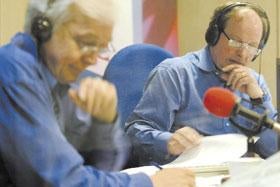
BBC radio’s flagship Today programme was disrupted today as a strike by journalists over jobs hit the corporation’s output.
The Radio 4 programme was broadcast an hour later, at 7am, because of industrial action by members of the National Union of Journalists (NUJ), while BBC Breakfast TV announced it was running a slightly different programme due to the strike.
The NUJ said the walkout, in protest at compulsory redundancies, was being “solidly supported”, with picket lines mounted outside studios across the UK.
NUJ general secretary Michelle Stanistreet joined a picket line outside the BBC TV Centre shortly after the strike started at midnight.
She was back on a picket line at 5am in the West End of London and said Radio 1 presenter Chris Moyles gave the NUJ a message of support as he arrived for work.
“All the indications are that the strike is being solidly supported, and members of other unions have refused to cross picket lines, so morale is high,” she told the Press Association.
She accused the BBC of “provoking” the strike, insisting it only involved a handful of job losses, but the corporation said there were 100 posts for which compulsory redundancy was “regrettably unavoidable”.
Union members voted by 72 per cent in favour of strikes in protest at compulsory job losses, but Ms Stanistreet said the union had suggested a number of solutions to the dispute, adding that an offer from the conciliation service Acas for peace talks had not been taken up by management.
“The BBC’s rejection of our offer to go to Acas has really angered our members. There are so many people who want to leave the BBC that this could be resolved through negotiations. The NUJ has a long-standing policy of no compulsory redundancies, and it is clear that our members at the BBC are fully prepared to stand up for their colleagues under threat.
“Jobs are being saved and created at management level but journalists are losing theirs. It is hard to avoid the conclusion that BBC management wants thousands of its journalists to go on strike rather than settle the dispute.
“If that is the case, it confirms our members’ worst fears about the management strategy of introducing compulsory redundancy at the BBC.”
A BBC spokesman said: “We are disappointed that the NUJ is intending to strike and apologise to our audience for any disruption to services this may cause.
“Industrial action will not alter the fact that the BBC is faced with a number of potential compulsory redundancies, following significant cuts to the central Government grants that support the World Service and BBC Monitoring.
“We will continue with our efforts to reduce the need for compulsory redundancies. However, the number of posts that we are having to close means that unfortunately it is likely to be impossible for us to avoid some compulsory redundancies.
“We have had to reduce the number of posts in World Service and BBC Monitoring by 387, following significant cuts to the central Government grants that support these services. In a significant majority of cases we have been able to reach this through voluntary redundancy or redeployment.
“However, there are in excess of 100 BBC posts for which compulsory redundancy is regrettably unavoidable, and this is our focus, regardless of whether staff are members of unions.”
In Scotland about 30 NUJ members were manning a picket line outside the BBC Scotland headquarters at Pacific Quay in Glasgow.
They were planning to hold a rally later in the morning.
There were also pickets in Lerwick in Shetland, Inverness, and Edinburgh.
The NUJ has more than 200 members working in BBC offices and newsrooms across Scotland.
Pete Murray, NUJ Scotland representative at the BBC, said he hoped the strike would make the BBC “see sense”.
He said: “We are concerned that the BBC just wanted to provoke this because they wanted to have a trial of strength and that`s not good for the public.
“We don`t think that is a responsible way to behave.
“We are ready to talk to them at any point.”
Email pged@pressgazette.co.uk to point out mistakes, provide story tips or send in a letter for publication on our "Letters Page" blog
